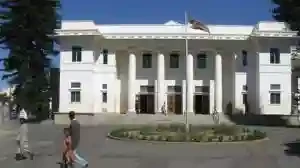
ZIMBABWE soon after independence in 1980 had a slogan that said Education for all by 2000.
This promise and its early implementation have borne some fruits, but the last 25 years have shown that education is no longer for all, but a preserve for the privileged few.
At independence, the ruling Zanu PF party had been clear that Zimbabwe would be a socialist country.
The premier then, Robert Mugabe, preferred calling it scientific socialism.
At its basic, the ideology looked at bringing the fruits of independence to the majority and not a minority free.
The education for all was not limited to education, but to all other social justice clusters like health, housing and energy (electricity).
The government increased its social spending for the first decade of independence on the afore-mentioned areas and even for good measure included land redistribution and home ownership for those in urban areas.
With a high social spending budget, a war in Mozambique and failing parastastals budget deficits started growing.
- Corruption Watch: Get scared, 2023 is coming
- Corruption Watch: Get scared, 2023 is coming
- Letters: Ensuring Africa’s food security through availability of quality seeds
- Is military's involvement in politics compatible with democracy?
Keep Reading
The honeymoon phase of independence, where large countries from both the Eastern and Western blocs had extended to Zimbabwe, started to dry up.
The final nail to the coffin was the collapse of the USSR or Russia Federation, making the globe unipolar.
Zimbabwe faced the grim prospect of having to cut back on its budget spending.
Unfortunately, the “haircut” was deep on social spending.
The Brettonwoods institutions insisted on Zimbabwe to take the painful austerity measures called Economic Structural Adjustment Programme (ESAP).
Under ESAP, privatisation was a big thing. It emphasised on lean and efficient governments playing a facilitating and regulatory role to private enterprise.
The immediate pain was felt in education and health and the public service or those who worked in parastatals.
Education funding was severely curtailed and public education bore the brunt.
Education ceased to be for all by 2000. I reference this because there is one man who has always been there in government since 1980, except for a brief two weeks in 2017 when he went into self-imposed exile.
The man is President Emmerson Dambudzo Mnangagwa.
I don’t want to believe that in the first decade of independence, Mnangagwa was implementing socialist policies he did not believe in.
He seems to be a proponent of capitalism and this is well encapsulated by the mantra Zimbabwe is open for business post the November 2017 coup.
It is a self-evident truth that in the past seven years post the November 2017 coup, a few businessmen and women politically connected have gained a foothold and increased their riches fundamentally in a short seven years.
This has been seen in the following three sectors education, health and housing.
Most of those who have made it in these sectors rode on their government connections who smoothly gave the requisite approvals even in situations that are clear to everyone that they fell short of the minimum requirements.
This madness reached new depths this week. Education was sacrificed and who knows what’s next.
The Herald edition of September 26, 2024 carried an advertisement from the Local Government and Public Works ministry.
The tender invitation read: Tenders are invited for leasing a government primary school in Chimanimani.
The school was identified as Cashel Valley Primary School, with reference number CSL13/5 and sits on four hectares of land.
“The tenders must be enclosed in sealed envelopes and endorsed on the outside with the advertised school reference number and must be delivered by hand to the provincial offices listed below on or before October 14, 2024 at 1400 hours which will be the time for opening tenders. All bidders are invited for the opening,” part of the advert read.
A quick inquiry with the relevant ministry revealed that the school was demolished because of lack of maintenance.
The ministry now wants a private player to construct a new modern primary school and operate it on a long lease, most likely 25 years.
This is setting a wrong precedent. Zimbabwe is being turned into a country that does not care about its future.
This is the same country that could spend millions of United States dollars on government villas which never got ready for the Sadc Summit.
It is the same government that this week dished out top-of-the-range 4x4 off-roaders to chiefs, but cannot construct a basic primary school in Chimanimani.
How long can the government be sub-contracting its responsibilities to private capital or development partners.
After Cyclone Idai, most of the reconstruction in Chimanimani was done by donors.
Now, this very same community has been sacrificed to be a guinea pig on privatisation of public education institutions.
It boggles my mind whoever came up with that idea in government, but I’m not surprised considering how they have turned public wealth into private capital.
A case in example is how those allocated peri-urban farms have subdivided them into residential estates without paying a dime to the government.
Why was the local community not given an opportunity to develop the school no matter how rudimentary the structures would be?
The answer is simple it is an opportunity for a politically-connected individual to mint dollars from a public facility.
Its crass capitalism under the veil of Zimbabwe is open for business.
We have noticed this trend of politicians and their associates benefiting from public resources for a long time.
Most urban councils leased out their beer outlets or creches for a song, some sold residential properties at a discount to influential people.
Now the central government has joined the bandwagon, it wants to do it on a grand scale and lease out schools.
This has to be stopped and stopped now.
If not, it will not be a surprise to wake up one day Robert Gabriel Mugabe International Airport or Parirenyatwa Group of Hospitals or University of Zimbabwe privatised or leased out on a long lease.
Individuals, no matter how powerful, should not be allowed to make money from public resources in the name of development.
- Paidamoyo Muzulu is a journalist based in Harare. He writes here in his personal capacity.









